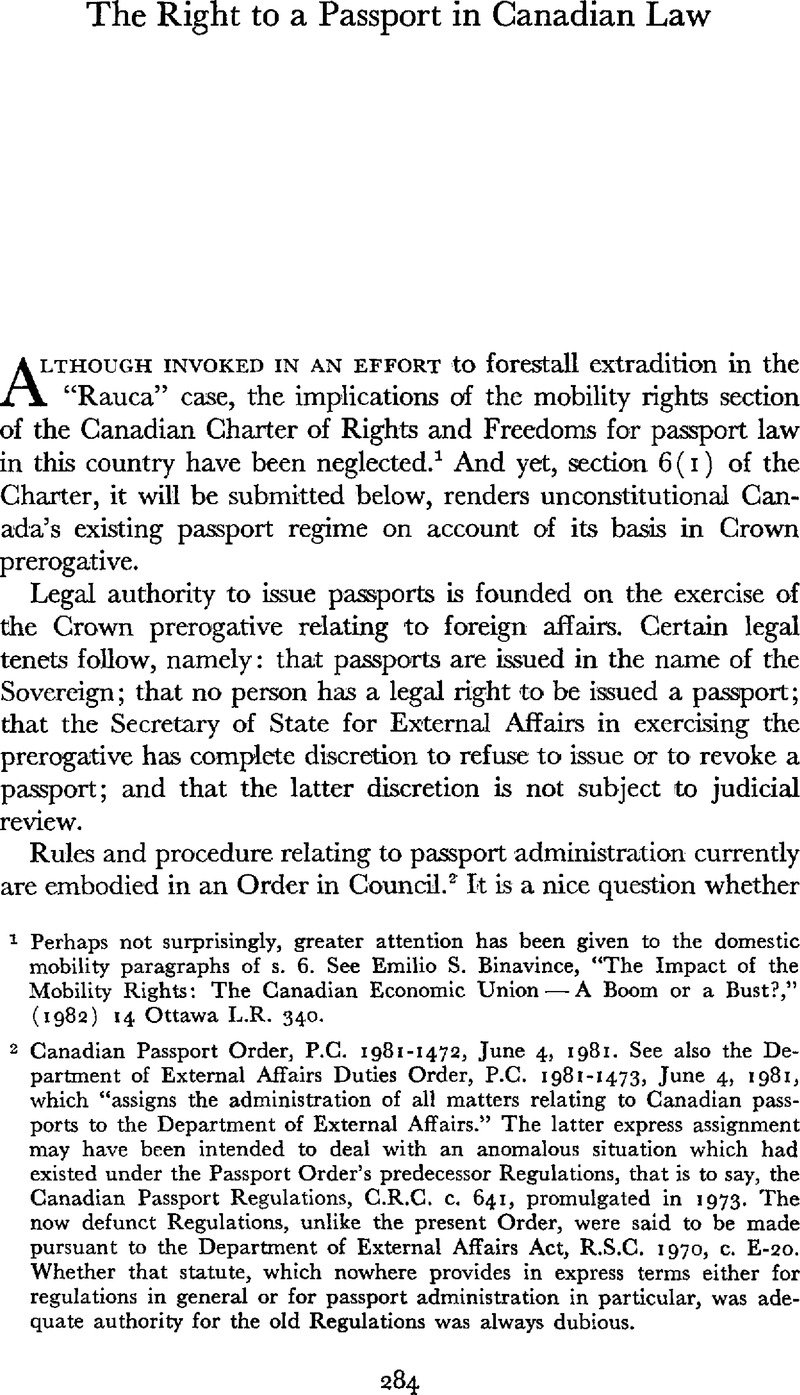Published online by Cambridge University Press: 09 March 2016

1 Perhaps not surprisingly, greater attention has been given to the domestic mobility paragraphs of s. 6. See Binavince, Emilio S., “The Impact of the Mobility Rights: The Canadian Economic Union — A Boom or a Bust?,” (1982) 14 Ottawa L.R. 340.Google Scholar
2 Canadian Passport Order, P.C. 1981–1472, June 4, 1981. See also the Department of External Affairs Duties Order, P.C. 1981–1473, June 4, 1981, which “assigns the administration of all matters relating to Canadian passports to the Department of External Affairs.” The latter express assignment may have been intended to deal with an anomalous situation which had existed under the Passport Order’s predecessor Regulations, that is to say, the Canadian Passport Regulations, C.R.C, c. 641, promulgated in 1973. The now defunct Regulations, unlike the present Order, were said to be made pursuant to the Department of External Affairs Act, R.S.C. 1970, c. E-20. Whether that statute, which nowhere provides in express terms either for regulations in general or for passport administration in particular, was adequate authority for the old Regulations was always dubious.
3 In practice, however, absolute discretionary power over passports appears to be circumscribed by policy considerations, chief among which is a desire to avoid offending public sensibilities and bringing the prerogative itself, as it pertains to passports, into disrepute. As a noted British commentator has written, “the aura of an absolute discretion hangs over the system, although there is little evidence of manifest abuse in practice”: Goodwin-Gill, G., International Law and the Movement of Persons between States 38 (Oxford, 1978).Google Scholar That commendable executive benevolence has not, however, led to the conclusion that absolute discretion ought to be formally foresworn and replaced by legal entitlement to passports.
4 Supra note 1, at 358.
5 As noted above, legal authority to issue passports is founded on the exercise of the Crown prerogative relating to foreign affairs. It is submitted that that linkage is anachronistic. No doubt there is room for executive discretion in other matters more convincingly related to foreign affairs. In such matters, it may be the exercise of the discretion in particular instances (e.g., cruise missile testing) that is challenged, rather than the existence of the discretion itself; in these cases, the constitutional question to be decided will involve the nexus between the specific exercise of discretion and the alleged violation of a right. In the case of passports, by contrast, it is the very existence of discretionary power, quite apart from its exercise, that must be challenged.
6 Supra note 1, at 358.
7 Binavince notes that “the Charter makes the fundamental assumption that governments are potential infringers, rather than protectors, of the mobility rights. Accordingly, the mobility rights provisions, like all provisions of the Charter, seek to create a relatively secure sphere of moral minimum for human dignity from which the powers of government are banned”: ibid., 347.
8 It is true that any country that wishes to admit a Canadian without a passport may do so. However, only a tiny handful of countries will do so, the United States being the most notable example. The passport is not required to enter or leave Canada, but no one can go far without it. As well, while a citizen does not in theory require a passport for exit from or entry to Canada, as a practical matter passports are the most commonly used means of establishing citizenship and identity at the Canadian border.
9 See, for instance: Kent v. Dulles, Sec. of State, 357 U.S. 116 (1957) (S.C.); Zemel v. Rusk, Sec. of State, 38 U.S. 1 (1964) (S.C). Kent involved the denial of passports to the petitioners by the U.S. Secretary of State because of the alleged communistic beliefs and associations of the petitioners and their refusal to file affidavits concerning present or past membership in the Communist party. The Supreme Court held that the Secretary of State was not authorized to deny passports for these reasons. In Zemel, the Court reluctantly upheld “area restrictions” (restrictions against travel by U.S. citizens to specific foreign states) on the ground that they had foreign policy ramifications affecting all citizens and were matters of a political nature. The Court decided that the Secretary of State was statutorily authorized to refuse to validate passports of U.S. citizens for travel to Cuba and that the exercise of that authority was constitutionally permissible. It was noted that the fact that a liberty cannot be inhibited without due process of law does not mean that it can under no circumstances be inhibited. The majority in Zemel thus distinguished Kent without overruling its ratio; the minority argued that Kent applied.
10 Aptheker v. Sec. of State, 376 U.S. 500 (1963) (S.C).
11 Sawhney v. Assistant Passport Officer (1967), A.I.R. (S.C), 1836.
12 Citizenship Act, S.C. 1974–75–76, c. 108; amended by 1976–77, c. 52; 1977–78, c. 22.
13 Returnability means evidence of the place to which a would-be entrant may be returned by the receiving state, should his presence there become undesirable for whatever reason.
14 William Joyce v. Director of Public Prosecutions, [1946] A.C. 347; [1946] 1 All E.R. 186 (H.L.).
15 Ibid., 191.
16 British Section of the International Commission of Jurists, Going Abroad: A Report on Passports 12 (1974).
17 Ibid., 19.
18 Ibid., 20.
19 Refugees Convention (1951); Stateless Persons Convention (1954).